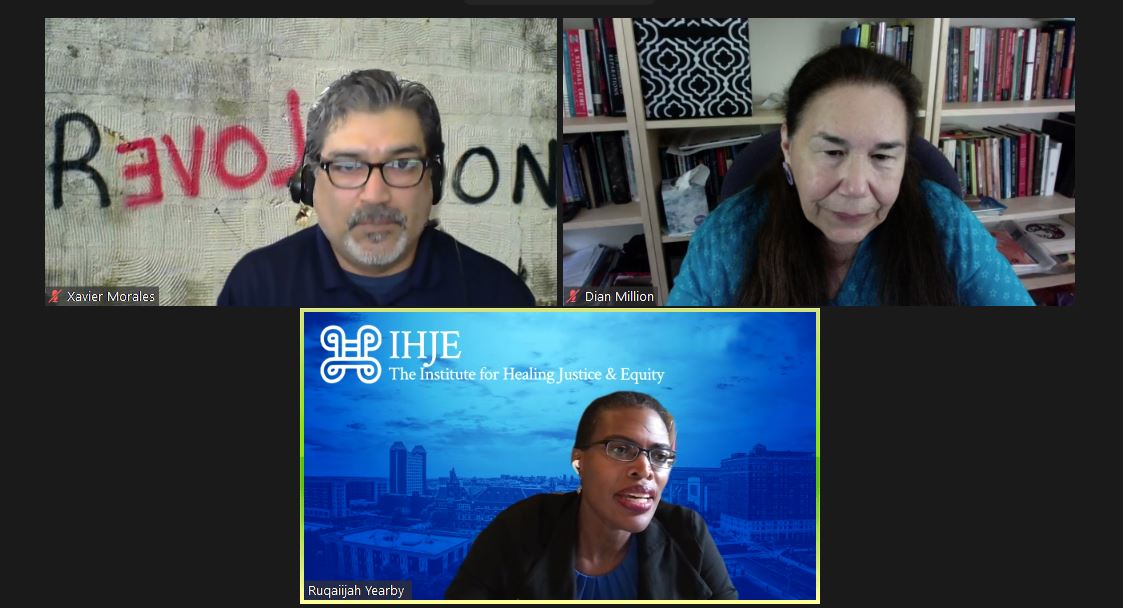Health Law and Policy Program Hosts “Health Justice: Engaging Critical Perspectives in Health Law & Policy” Conference
Oct. 6, 2020

On Friday, Oct. 2, American University Washington College of Law Health Law and Policy Program, in partnership with ChangeLab Solutions and the Saint Louis University Institute for Healing Justice and Equity (IHJE), presented “Health Justice: Engaging Critical Perspectives in Health Law and Policy” – a virtual conference that addressed structural racism, poverty, and other social determinants of health.
The conference featured three unique panel discussions with leading scholars and advocates, which discussed securing distributive justice, valuing human dignity, and empowering communities in order address to the most pressing challenges in health law and policy.
“We couldn’t be more excited that several hundred researchers, organizers, government officials, NGO staffers, health professionals, and students from across multiple disciplines are joining us today,” said Health Law and Policy Program Director and Professor Lindsay Wiley, who welcomed attendees alongside ChangeLab Solutions CEO Sarah de Guia and Professor Ruqaiijah Yearby, IHJE executive director and co-founder.
.JPG)
According Wake Forest School of Law Visiting Professor Emily Benfer, over the last decade, the concept of health justice has emerged and developed as a framework for eradicating health inequality, particularly among vulnerable populations and historically marginalized groups. This can include those with disabilities, people of color, those in poverty, LGTBQ individuals, and the elderly, among others.
“For these groups, health disparities are often linked or caused by discrimination correlated with socio-economic status. Health justice calls for policy makers to provide access to basic health-related rights and protections, and supports elimination of health disparities,” Benfer said, noting the strategy is especially important for protecting marginalized populations during the ongoing COVID-19 pandemic.
When people think about health policy, they think directly and solely about health care outcomes, said Associate Professor Jamila Michener, co-director of the Cornell Center for Health Equity.
“But look beyond those immediate health measures, and think about social and political life. Right now, the people for whom health justice is a dream and not a reality, are folks that are at the economic and political margins,” she said. “Part of the reason health justice isn’t actualized in the present moment is because folks who don’t have access to health justice, also don’t have power. And part of what I do is think about how the structures how we have in place now, in terms of health and other types of public policy, shape who has this power.”
Having different types of groups “at the table” when defining and fixing issues within health policy allows the conversation to be more community- and equity-centered said Xavier Morales, executive director of The Praxis Project.

“The work we do on soda taxes is twofold: one, we want to decrease consumption of sugary drinks, and have the healthier choices accessible,” Morales said. “But we’re also working with our public health allies to recognize the agency of community, and how we need to build knowledge to help institute taxes and other interventions. And we need to have the revenue from those taxes reinvested backed into the communities that are most impacted, so that they can continue to do advocacy on the issues most important to them.”
The conference is part of the Health Justice: Engaging Critical Perspectives Initiative, which also encompasses a series of virtual workshops held in summer 2020, a face-to-face conference tentatively planned for October 7-8, 2021, and an accompanying symposium issue to be published in the Journal of Law, Medicine & Ethics. The Initiative seeks to foster theory, practice, and action on health justice by applying critical perspectives – including critical race theory, latinx critical legal theory, class legal theory, black feminist theory, feminist legal theory, queer theory, critical disability studies, and more – to the most pressing challenges in health law and policy.